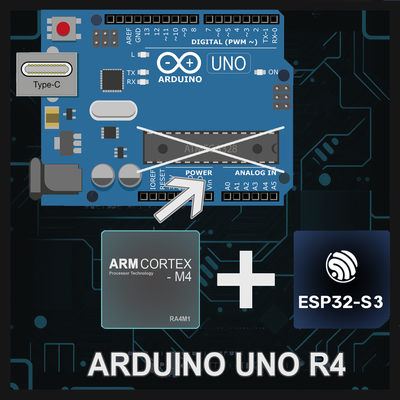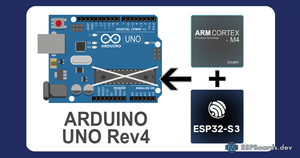Arduino UNO R4 announcement. News for the ESP32 community
With the new Arduino UNO R4 announcement, changes are coming not only for the Arduino community but also for the ESP32. Find out how it affects ESP32 community
During Arduino Day 2023, which happened on March 25, 2023, the new updated Arduino UNO version was announced. It is the Arduino UNO R4, which packs several new features and updates, but for us, the most exciting news is, that it will come with the integrated ESP32-S3 WiFi module!
What is the Arduino UNO? #
If you know ESP8266 or ESP32 microcontrollers, you probably also know Arduino, as the Arduino SDK (Software Development Kit) has great support for the ESP chips. And next, if you know Arduino, you probably know the Arduino UNO, which is the most popular Arduino board, that since its release in 2010, has revolutionized the DIY and hobbyist communities, by providing an easy-to-use platform for IoT development.
Since the first Arduino UNO release, it has kept its form factor, pinout and main features all the way to the newest Arduino UNO R3, while focusing on the improvements, such as power supply, USB interface and more. What the Arduino also kept all the way through revision 1 to revision 3, is the ATmega328P microcontroller, but this one is about to change.
The Arduino UNO R4 #
The Arduino UNO R4 is set to be released in late May of this year, it is about to change the Arduino UNO family. While the R4 is focused to keep the most known features of the UNO family, such as the form factor, together with the shield compatibility and the 5V operating voltage, it will change its core - the processor. And this might be huge news to some, as it will be using the processor with the ARM architecture.
The new Arduino UNO is announced to have the Arm Cortex M4 MCU, or more specifically, the RA4M1 by Renesas, which runs at 3 times the speed of the previous Arduino UNO at comes at 48 MHz. While the older Arduino UNO versions used the 8-bit microcontroller, the new Cortex MCU is 32-bit! It also has the SRAM size increased 16 times - from 2kB to 32kB - and the flash memory 8 times - from 32kB to 256kB. That is a huge performance upgrade, which will allow more complex projects.
The long waited feature for Arduino UNO is the USB port. The community was complaining about the old micro-USB port for a while and not for nothing! The new Arduino UNO R4 finally comes with a built-in USB-C port. And that's not it, it also has a maximum power supply voltage increased to 24V, which will allow it to be used for a wider range of applications.
The Arduino UNO R4 will be available in two versions - the UNO R4 WiFi and UNO R4 Minima, and yes, you got it right, Arduino UNO will support WiFi!
Arduino UNO R4 WiFi vs Arduino UNO R4 Minima #
While both UNO R4 WiFi and UNO R4 Minima will use the same core components mentioned earlier - Cortex M4 processor, with 32kB SRAM and 256kB Flash memory - the Minima will provide more power than previous releases but will keep its core features more or less the same.
However, the UNO R4 WiFi version is about to change what you know and think about Arduino UNO. Apart from the Coretex M4 processor, it will additionally come with the built-in ESP32 S3 WiFi module, or more specifically - the ESP32-S3-MINI-1 module.
The new UNO R4, together with ESP32, will surely put the Arduino UNO to the next level, in terms of performance and connectivity capabilities. The ESP32 module will enable the Arduino UNO, not only with the WiFi connectivity, as the name suggests but also the built-in Bluetooth. Additionally, if you already thought there is a huge power upgrade for the new Arduino UNO version, the ESP32-S3-MINI-1 itself has 512kB SRAM on-chip memory and comes with the dual-core LX7 microprocessor, which can run at frequencies up to 240 MHz. With these specifications, you can make sure, that the WiFi and Bluetooth-enabled applications will be able to run smoothly on Arduino UNO R4.
The ESP32-S3 supports, and therefore the UNO R4 will, the 2.4 GHz WiFi (802.11 b/g/n) and the Bluetooth Low Energy (BLE) 5.0, meaning you can create projects with several advanced connectivity options, without the need of connecting external shields or external connectivity modules.
While we don't know the prices yet, the two different versions for UNO R4 will mean there will be a price difference between the Minima and WiFi versions. As the ESP chips are very cost-effective, we hope the WiFi version will keep around the same price range as the UNO R3, while the Minima price range will go down, due to the high competition in the current microcontrollers world.
What does this mean for the ESP32 community? #
The ESP32 microcontrollers are already supported by the Arduino SDK, and many developers use the Arduino Core and Arduino IDE to develop the applications for ESP32 microcontrollers. The fact that the ESP32 module will be integrated into the most popular Arduino board (Arduino UNO), means that we can expect even better native support for the ESP32 chips.
Additionally, with the integration of the ESP32 module into the Arduino Uno R4, more developers will be exposed to the ESP32, which should attract more users to the ESP32 community. And as always, with more people and a bigger community, we can expect more tutorials, projects, innovation and new applications for the ESP32 microcontrollers.
Arduino UNO R4 release date #
While the new Arduino UNO was announced during Arduino Day, on March 25th, 2023, it is set to be released in late May 2023, but does not have a definitive date yet. If you want to get notified, when UNO R4 becomes available, you can join the official waiting list on the Arduino Store page.
Update 29/06/2023: Arduino UNO R4 is now available!
Transition to the ARM architecture #
As the demand for microcontrollers continues to grow, so does the need for faster and more capable microcontrollers. Therefore Arduino has taken a step to transition the Arduino UNO from its traditional AVR architecture to the more powerful ARM architecture. While this shift presents more opportunities for the makers and developers, it also presents some challenges.
One of the main challenges is compatibility. The AVR architecture used in previous Arduino boards, such as the UNO R3, has been around for decades and has a large user base. Many libraries, examples, and projects have been developed based on AVR-specific features and registers. Transitioning to a new architecture requires rewriting or porting these libraries and code to work with ARM-based microcontrollers.
The AVR architecture used in previous Arduino boards, such as the UNO R3, has been around for decades and has a large user base. Many libraries, examples, and projects have been developed based on AVR-specific features and registers. Some libraries may rely on low-level code optimized for AVR, which may not be directly transferrable to ARM. Transitioning to a new architecture requires rewriting or porting these libraries and code to work with ARM-based microcontrollers.
To address these challenges, the Arduino team has launched an early access program for library developers to test and port their code to the new ARM architecture, used on UNO R4. The program provides participants with an UNO R4 board, technical documentation, and direct support from the Arduino team. Participants are expected to run tests, fix compatibility issues, and merge their changes into the main project branch.
The goal of this program is to ensure that popular libraries and projects can work seamlessly on the new architecture and minimize the disruption for existing Arduino users.
If you are interested in joining the Arduino Early Access Program, you can check the requirements and apply to the program on the official Arduino website.
Conclusion #
The release of the new Arduino UNO R4 is exciting news not only to the Arduino community but also to the ESP32 community. The new Arduino UNO board presents huge performance updates and exciting features, such as the integrated WiFi module. While on the Arduino side, there might be some challenges due to the transition from AVR to ARM architecture, Arduino has a plan to tackle them with the Early Access Program (EAP).
On the other hand, the ESP32 developers should expect only good news, due to the integrated ESP32-S3 WiFi module into the Arduino UNO R4 WiFi version board, as it will bring more people into the ESP32 community with a wide range of contributions, starting from tutorials and projects, finishing with the new innovative ideas.




